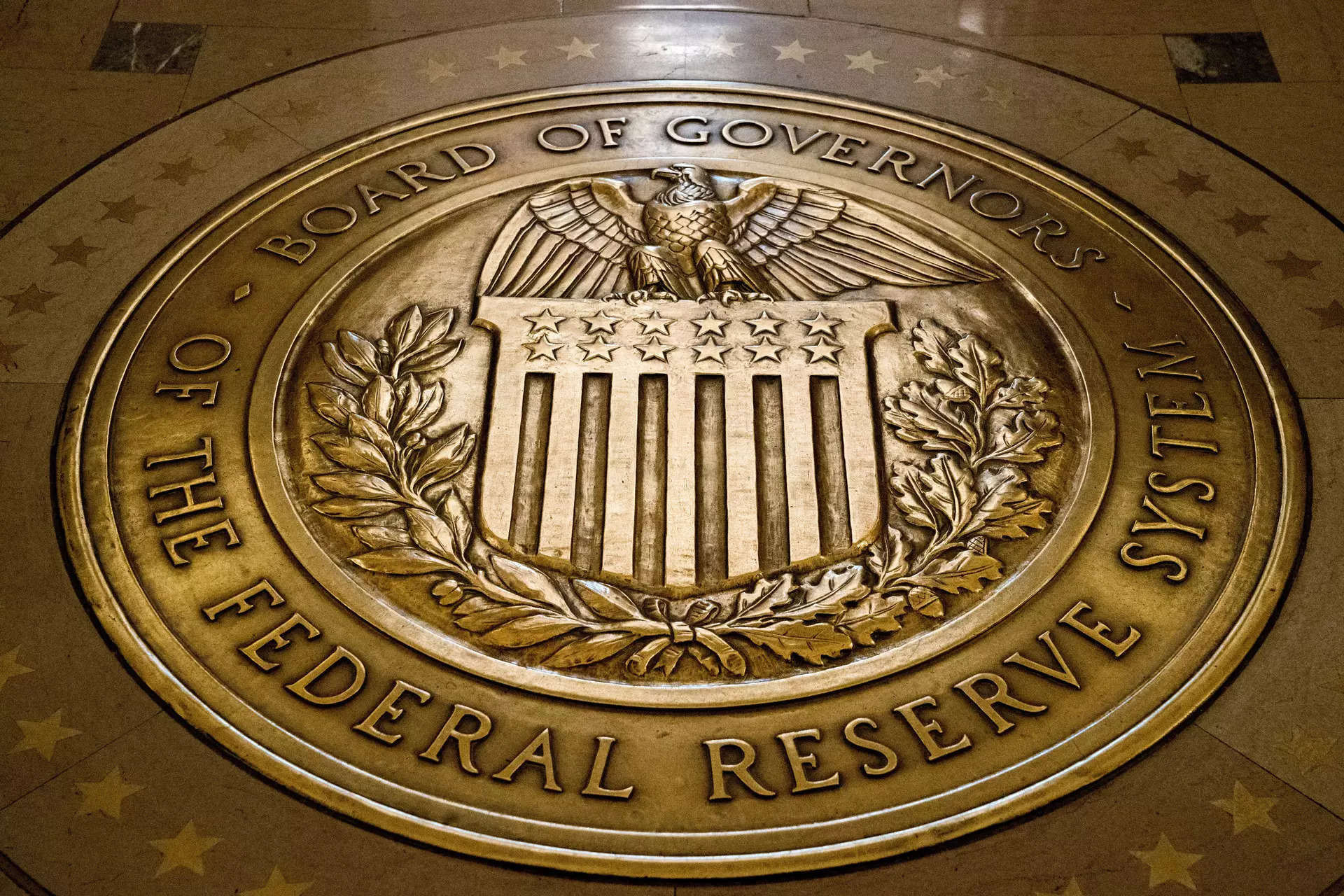Commodities
Gold falls in price – hawkish stance of Fed supports the dollar

Gold prices experienced a decline on Wednesday due to the strengthening dollar, following recent statements from the U.S. Federal Reserve officials that diminished expectations of interest rate cuts this year.
The spot gold price fell by 0.14% to $1,985.79 per troy ounce, trading close to a two-week low reached on Tuesday.
According to Giovanni Staunovo of UBS, “It appears that some market participants are still anticipating another rate hike from the U.S. Federal Reserve, which is putting pressure on gold.”
Chicago Fed Chairman Austin Goolsbee stated that it is premature to discuss a rate cut, while Cleveland Fed President Loretta Mester mentioned that the central bank has not yet reached a point where it can maintain interest rates at a stable level for an extended period.
Staunovo added, “We still anticipate prices to rise over the next 12 months, with gold expected to reach $2,200 per ounce. However, the next price surge will likely occur when the Fed’s tone becomes more dovish.”
Despite these factors, concerns regarding a potential U.S. default and its economic consequences have helped support precious metal prices.
U.S. President Joe Biden and Republican Congressional leader Kevin McCarthy came close to an agreement on the debt ceiling on Tuesday in an effort to prevent a catastrophic default, although full consensus has yet to be reached.
Palladium experienced a decline of 0.59% to $1,492.88 per ounce, while silver fell by 0.23% to $23.68 per ounce. On the other hand, the price of platinum rose by 1.17% to $1,069.58.
Earlier, we reported that EU authorities predicted Brent price to fall to $72 a barrel in 2024.
Commodities
Oil set for third weekly decline, pressured by Gaza ceasefire hopes

By Laila Kearney and Georgina McCartney
LONDON (Reuters) -Oil prices slipped on Friday and were on track for a third consecutive weekly decline, pressured by muted demand in China and hopes of a Gaza ceasefire deal that could ease Middle East tensions and accompanying supply concerns.
futures for September dipped 56 cents to $81.81 a barrel by 1250 GMT. U.S. West Texas Intermediate crude for September fell 40 cents to $77.88.
For the week, Brent is trading down almost 1% while WTI is down more than 2%.
Recent data, such as July 20 figures showing that China’s total fuel oil imports dropped 11% in the first half of 2024, have raised concern about the wider demand outlook in China.
In the Middle East, hopes of a ceasefire in Gaza have been gaining momentum.

A ceasefire has been the subject of negotiations for months, but U.S. officials believe the parties are closer than ever to an agreement for a six-week ceasefire in exchange for the release by Hamas of female, sick, elderly and wounded hostages.
Oil price declines were capped, however, by threats to production from Canadian wildfires, a large stocks draw and continued hopes of a September cut to U.S. interest rates after strong economic data, said PVM oil analyst Tamas Varga.
Commodities
Oil prices fall; set for weekly losses on demand concerns

Investing.com– Oil prices fell Friday, on course for a third consecutive losing week as concerns over sluggish demand conditions in Asia weighed.
At 09:00 ET (13:00 GMT), fell 0.9% to $81.62 a barrel, and dropped 0.8% to $77.66 a barrel.
Crude set for third straight week of losses
Both benchmarks are on course for another losing week, the third in succession, with down just under 1% and WTI nearly 3% lower.
Persistent concerns over slowing growth and demand in top importer China have been the dominant factor, part triggered by GDP data from last week, which showed the Chinese economy grew less than expected in the second quarter.
Additionally, more data this week showed the country’s apparent oil demand fell 8.1% to 13.66 million barrels per day in June.
Beijing unexpectedly cut a swathe of lending rates this week, further trying to loosen monetary policy amid growing concerns over sluggish growth.
Apart from China, uncertainty over Japan also grew following middling , while weak activity data in Europe also pointed to economic woes.
Gaza ceasefire in focus
Also weighing on the crude market have been increasing hopes of a ceasefire in Gaza.
The leaders of Australia, New Zealand and Canada called for an immediate ceasefire in a joint statement on Friday, while U.S. Vice President Kamala Harris has pressed Israeli Prime Minister Benjamin Netanyahu to help efforts at reaching a deal, striking a tougher tone than President Joe Biden.
A ceasefire has been talked about for months, but if it was to occur then some of the risk premium could be removed from the market.
Strong US GDP, rate cut hopes offer some support
On the flip side, data, released on Thursday, showed that the U.S. economy grew more than expected in the second quarter, despite pressure from high rates and relatively sticky inflation.
The reading drove up hopes that the world’s biggest fuel consumer was headed for a “soft landing,” where economic growth remained steady while inflation eased.
These hopes were also lifted by the data showing overall U.S. inflation cooled as expected in June.
According to data from the Bureau of Economic Analysis, the (PCE) price index slipped to 2.5% in June, from 2.6% the prior month. .
Stripping out volatile items like food and fuel, the year-on-year “core” gauge, widely known as the Fed’s preferred gauge of inflation, remained at 2.6%, only marginally above the Federal Reserve’s 2% target.
This sparked increased optimism over a potential interest rate cut by the Federal Reserve in September.
Data showing steady drawdowns in U.S. also offered some positive cues to oil markets, as fuel demand in the country remained robust amid the travel-heavy summer season.
(Ambar Warrick contributed to this article.)
Commodities
Canadian wildfire reaches Jasper, firefighters battle to protect oil pipeline

(Reuters) -A wildfire reached the Canadian town of Jasper, Alberta on Wednesday, one of hundreds ravaging the western provinces of Alberta and British Columbia, as firefighters battled to save key facilities such as the Trans Mountain Pipeline, authorities said.
Wildfires burning uncontrolled across the region include 433 in British Columbia and 176 in Alberta, more than a dozen of them in the area of Fort McMurray, an oil sands hub.
The pipeline, which can carry 890,000 barrels per day (bpd) of oil from Edmonton to Vancouver, runs through a national park in the Canadian Rockies near the picturesque tourist town, from which about 25,000 people were forced to evacuate on Tuesday.
“Firefighters … are working to save as many structures as possible and protect critical infrastructure, including the wastewater treatment plant, communications facilities, the Trans Mountain Pipeline,” Parks Canada said in a post on Facebook (NASDAQ:).
The pipeline operator did not immediately respond to a Reuters request for comment, but said earlier it was safely operating the pipeline and had deployed sprinkler protection as a preventive measure.
In the day’s last update, Jasper National Park said it could not report on the extent of damage to specific locations or neighbourhoods, and that it would provide further updates on Thursday.
Canadian Prime Minister Justin Trudeau said his government approved Alberta’s request for federal assistance.
“We’re deploying Canadian Armed Forces resources, evacuations support, and more emergency wildfire resources to the province immediately – and we’re coordinating firefighting and airlift assistance. Alberta, we’re with you.”
The town, and the park, which draws more than two million tourists a year, were evacuated on Monday night, at a time when officials estimated there were 15,000 visitors in the park.

Deteriorating air quality forced firefighters and others lacking breathing equipment to evacuate to the town of Hinton, about 100 km (62 miles) away, park authorities said on Facebook on Wednesday evening.
Officials of Parks Canada earlier said they expected rain to arrive overnight.

 Forex2 years ago
Forex2 years agoForex Today: the dollar is gaining strength amid gloomy sentiment at the start of the Fed’s week

 Forex2 years ago
Forex2 years agoHow is the Australian dollar doing today?

 Forex2 years ago
Forex2 years agoUnbiased review of Pocket Option broker

 Forex2 years ago
Forex2 years agoDollar to pound sterling exchange rate today: Pound plummeted to its lowest since 1985

 Cryptocurrency2 years ago
Cryptocurrency2 years agoWhat happened in the crypto market – current events today

 World2 years ago
World2 years agoWhy are modern video games an art form?

 Stock Markets2 years ago
Stock Markets2 years agoMorgan Stanley: bear market rally to continue

 Economy2 years ago
Economy2 years agoCrude oil tankers double in price due to EU anti-Russian sanctions

































